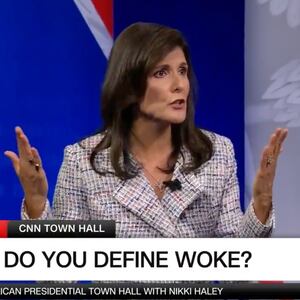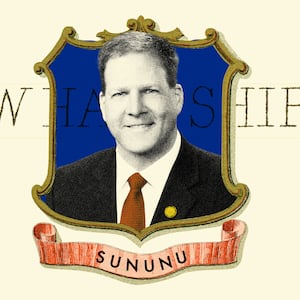LINCOLN, NH—When Nikki Haley tried to fire up a crowd of New Hampshire voters in late May by slamming Dylan Mulvaney—the transgender influencer with whom Bud Light controversially collaborated—the presidential hopeful called Mulvaney “a guy, dressed as a girl, making fun of women.”
After dropping that line, Haley waited a patient beat for the applause. But the applause never came.
The Granite State crowd seemed mostly oblivious to the Fox News storyline. And instead of a red meat appeal that would get the staunch conservatives going, it was an awkward moment that seemed to encapsulate the former South Carolina governor’s failure to find traction with voters.
And yet, six weeks later, Haley is still using a similar line, to similar effect, with no sense that the transphobic rhetoric isn’t working.
The armor of a culture warrior just doesn’t seem to suit Haley, who boasts actual experience as well as potential to connect with demographics the GOP has lost.
But Haley has apparently calculated that she can’t win the primary without at least trying that armor on—even when the audience isn’t buying the act, or has any idea what she’s talking about.
At a stop last week in the tiny town of Lincoln—at a NASA and space-themed cafe with room for a crowd of 40—Haley once again had an applause line fall flat around transgender politics. She described trans women in sports as “a massive issue for our girls right now.” The crowd barely reacted. If it’s an issue to GOP voters in New Hampshire, no one has apparently told them, despite conservative media’s best attempts.
A GOP event organizer who has attended several Haley events, and requested anonymity to speak candidly about the candidate, said those portions of Haley’s speech tend to be the most cringeworthy. They distinctly recalled her failed attempt at a joke about the Mulvaney controversy as “not playing well.”
It’s not just New Hampshire crowds: if polling and fundraising numbers are any indication, Haley’s candidacy has elicited a broad shrug. Most surveys of the primary field show she has the support of barely 5 percent of GOP voters nationally and in key states; her most recent fundraising haul was less than what Rep. Adam Schiff brought in for his U.S. Senate campaign in California.
With the GOP presidential primary entering a critical stretch, Haley’s allies say the candidate is just getting started, strategically playing the long game.
Pointing to the operation’s low spending rate and the Haley’s own experience as an accountant as reasons to trust the plan—along with around $17 million in cash on hand for a PAC supporting the only woman candidate in the GOP field—the belief is she’ll be in the best position to get hot at the right time, according to sources familiar with campaign strategy.
According to most everyone else, however, it’s clear the onetime rising GOP star has fallen back down to earth.
Among the half dozen Republicans who spoke to The Daily Beast for this story, Haley was compared to almost every fizzled front runner or disappointing nominee of the last decade, including Jeb Bush, Mitt Romney, Scott Walker, even Hillary Clinton.
One GOP strategist who does not work for any candidate likened her to Martin O’Malley, the now-obscure former Maryland governor who failed to break the Clinton versus Bernie Sanders duel in the 2016 Democratic primary.
“If she were VP,” the strategist continued, “she would be our Kamala Harris.”
Like the Jebs and Walkers before her, Haley is the exact kind of candidate who would have found success in a pre-Trump GOP. Once, she even hedged her bets on a post-Trump GOP, positioning herself to lead a party that left Trump behind.
But the party, clearly, has not left Trump behind. Aside from some criticism of the former president over Jan. 6, Haley has shirked from making a clear case that it should. Her campaign has offered gentle suggestions of a post-Trump future while declining to really criticize the current front runner.
Haley’s performance, caught between factions of the GOP base, has mostly raised speculation over whether she’s ultimately maneuvering for a vice presidential spot on someone else’s ticket.
Some Republicans do enthusiastically support Haley, but even their shows of support have been tinged with disappointment.
“I’ve been campaigning on my own for Nikki since the summer of 2021,” Marie Gray, a voter in Lincoln, told The Daily Beast. “Buying her books and mailing them out to friends and relatives, writing them letters about how great she is,” the retiree added with a laugh.
Despite her efforts, Gray said most of her friends are “still shopping around,” albeit with their own stack of Haley books and campaign literature she’s handed them.
Other Republicans inclined to support Haley, meanwhile, have not quite gotten there. When New Hampshire state Rep. Doug Thomas picked Haley up at the airport in the weeks leading up to the 2020 election, he thought they hit it off well and he expected to see much more of her.
Yet in the nearly three years since her first visit, Thomas has yet to attend one of the nearly 40 events the former United Nations ambassador has held in New Hampshire since officially declaring her run in February. He did see her headline a dinner for the Rockingham County GOP, which Republican state lawmakers were expected to attend.
For now, Thomas is waiting to see something new from the Haley campaign.
“I think she’s great, I like her, but I haven’t seen any unique movement out of her campaign," the Republican lawmaker said. "She comes here often and makes appearances, and that’s good, but I haven’t seen any spark.”
The Haley campaign did not comment for this story and has repeatedly kept the candidate from taking questions from reporters on the trail.
Two touchstone data points of presidential politics—polling and fundraising numbers—support the anecdotes doubting Haley’s candidacy.
Since she launched her campaign, Haley’s support has barely budged from around 3 percent, leaving her in a distant fourth place behind Trump, Florida Gov. Ron DeSantis, and former Vice President Mike Pence, according to the Real Clear Politics average. In New Hampshire, where Haley is working hard to make inroads, she is polling well behind former Gov. Chris Christie.
Then there’s the fundraising. Haley’s second quarter fundraising haul was a solid but modest $5.3 million for her campaign and another $2 million for affiliated committees. That total puts her well behind well-funded challengers like DeSantis—and her fellow South Carolinian, Sen. Tim Scott.
The GOP senator hoping to rise as the top non-Trump alternative raised $6 million in the most recent quarter—on top of a pro-Scott super PAC raising nearly $20 million—and has over $15 million in cash on hand. Scott’s polling numbers have shown forward momentum, too, setting up a war of attrition between the two South Carolinians to reach the primary in their home state, slated third on the GOP’s primary voting calendar.
Some Republican operatives and Trump allies have questioned whether Haley’s 2024 bid is more of a ploy to land a vice presidential nod, as previously reported by The Daily Beast, which has become a renewed gossip topic among New Hampshire Republicans.
One longtime GOP organizer pointed to a joke Haley made at a recent appearance with her friend Chris Sununu, the popular Republican governor of New Hampshire who sharply critiques Trump but declined to run for the nomination himself.
Onstage, Haley quipped that Sununu should get the formalities over with and just endorse her on the spot. But his failure to do so, said one Republican, is illustrative of why she is struggling in her campaign.
“They are friends, but make no mistake, when Sununu says he is going to be a kingmaker, he’s picking someone who can beat Donald Trump, which she can’t,” the GOP organizer and Sununu ally said. “Just because they’re friends, that doesn’t change the fact he’s only backing the one he thinks Donald Trump can get clobbered by, and she’s not it.”
The two dueling Haley personas on display when she hits the trail underscore her inability to take on Trump.
Sometimes voters get a show of Haley’s pre-Trump brand, which emphasizes her rise from obscurity in South Carolina and seems to resonate most. That part of her stump speech features emotionally poignant moments, including a pivotal point from her governorship: the removal of the Confederate flag from the state capitol grounds in 2015, after a white supremacist murdered nine Black churchgoers in Charleston.
Then there’s “Ambassador Haley,” an altered public persona that will forever be tinged by her association with Trump and her tenure in his administration—one she has struggled to define herself. A now-infamous Politico profile from 2021, which highlighted her tortured rationalizations for Trump’s behavior on Jan. 6 after criticizing it initially, still encapsulates the dynamic.
The stilted post-Trump Haley persona comes out in strange ways, often when she tries to offer some culture war grist to the audience, whether they’re in the mood for it or not.
In that section of the stump speech, Haley delivers a meticulously rehearsed, refined, and rehashed story about her son—one that some observers have interpreted more as a story about Haley herself.
At each of her campaign stops, Haley mentions her son’s experience as a student at Villanova University. She says she has “watched him write papers on things he doesn’t believe in just to get an A. That’s not us. That’s not America.”
The poetic significance of that anecdote for a particularly chameleon-like politician—and what it says about her campaign—was not lost on close observers of the primary.
When Haley goes to transgender issues and the culture wars, “that’s not really her strength, and it doesn’t come across as authentic,” the first New Hampshire Republican said.
“It’s a little bit of a Mitt Romney thing. He would’ve made a great president, looked fantastic on paper. But people weren’t buying it.”









